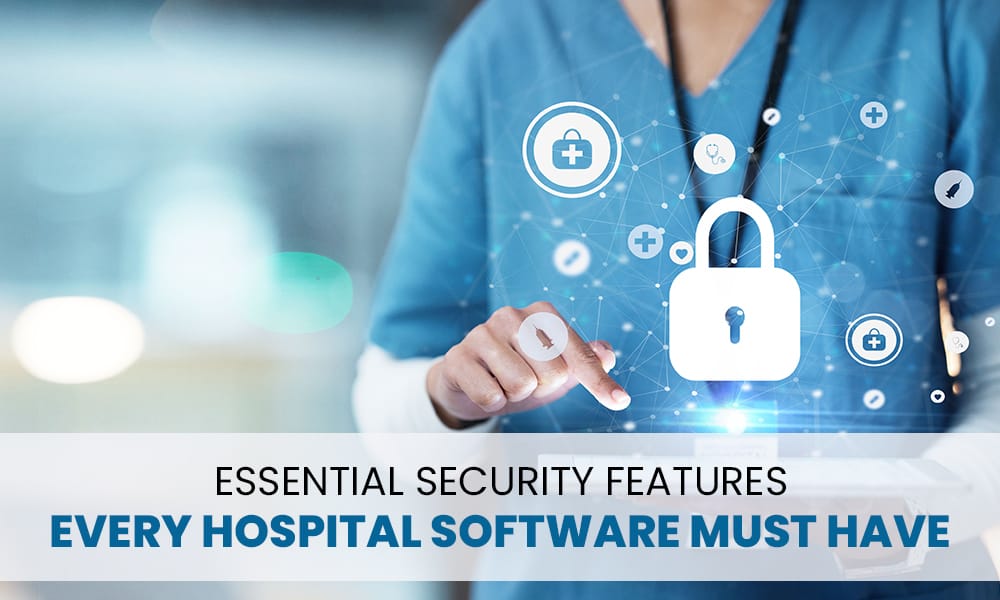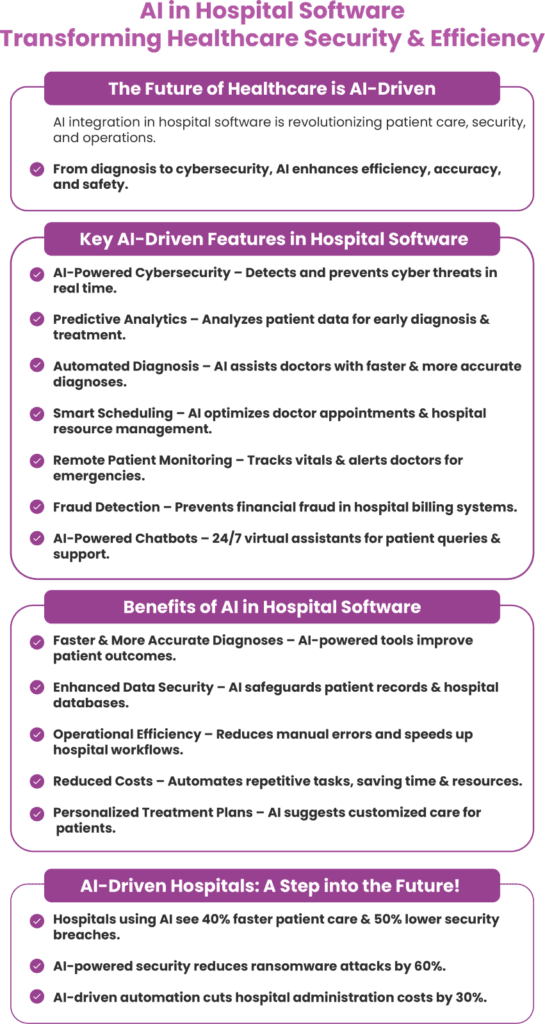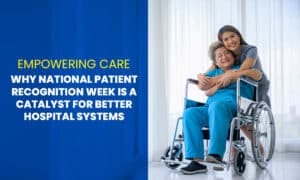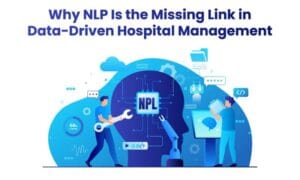
In recent years, the healthcare sector has witnessed a surge in cyberattacks, exposing the vulnerabilities in hospital information systems. Many hospitals, operating with outdated hospital security solutions and insufficient security measures, have become prime targets for cybercriminals.
The consequences of such breaches are severe, leading to compromised patient data, financial losses, and disrupted medical services. However, the advent of advanced, technology-driven security solutions for hospitals equipped with robust security features offers a beacon of hope. These modern solutions are designed to safeguard sensitive information, ensuring the safety and trust of both healthcare providers and patients.
The Imperative for Online Hospital Security Solutions
Hospitals are custodians of vast amounts of sensitive data, including patient medical records, personal identification details, and financial information. The digitisation of healthcare has streamlined operations but has also introduced potential vulnerabilities. Without stringent online security solutions for hospitals, they face numerous threats:
Data Breaches: Unauthorised access can lead to the exposure of confidential patient information.
Ransomware Attacks: Malicious software can encrypt hospital data, with attackers demanding ransom for restoration.
Operational Disruptions: Cyberattacks can cripple hospital systems, delaying treatments and compromising patient care.
Financial Losses: Beyond ransom payments, breaches can result in legal fees, regulatory fines, and reputational damage.
Given these potential dangers, it’s imperative for hospitals to implement comprehensive online security measures to protect their data and maintain operational integrity.
Cybersecurity Stats & Solutions
| Category | Details |
|---|---|
| % of Hospitals Attacked | 90% of hospitals have faced cyberattacks in the last five years. |
| Disruptions to Patient Care | 46% of breaches led to major disruptions in patient care. |
| Annual Ransomware Cost | $7.8 billion lost annually due to ransomware in healthcare. |
| Suggested Cybersecurity Measures | |
| – AI Threat Detection | AI-powered software for identifying threats. |
| – Secure Backups | End-to-end encryption and secure data backups. |
| – Geolocation Access Control | Restricting access based on location. |
| – Strong Authentication | Role-based access and strong passwords. |
| – Monitoring & Audit | Continuous system monitoring and logs. |
| – Staff Training | Ongoing education on phishing and cyber hygiene. |
Cybersecurity Threats in Hospitals
| Threat Type | Description |
|---|---|
| Data Breaches | Patient records are stolen and sold on the dark web. |
| Ransomware Attacks | Hackers lock hospital data, demanding ransom. |
| Phishing Scams | Staff tricked into sharing sensitive credentials. |
| Insider Threats | Employees misusing or leaking hospital data. |
| IoT Device Hacks | Medical equipment can be hijacked remotely. |
| DDoS Attacks | Cybercriminals overload hospital servers, causing downtime. |
| Financial Fraud | Billing systems and payment details are exploited. |
The Cost of Inadequate Security: Real-World Examples
The cost of inadequate security in healthcare is staggering, both in terms of financial losses and reputational damage. Studies and reports consistently highlight the increasing frequency and severity of cyberattacks on hospitals. Data from the US Department of Health and Human Services (HHS) shows a consistent rise in healthcare data breaches. While comprehensive, up-to-the-minute statistics for 2024 are still being compiled, the trend clearly indicates escalating threats. Here are some examples of security breaches that have occurred in recent years:
• Ascension Health Data Breach (May 2024): A ransomware attack compromised medical data of approximately 5.6 million individuals, including patient records, lab tests, and insurance information. The breach not only exposed sensitive data but also disrupted hospital operations, leading to significant financial and reputational damage.
• Alder Hey Children’s Hospital Incident (November 2024): The hospital faced a potential data breach after a ransomware group claimed to have stolen and published sensitive data, including patient records and donor information. Such incidents underscore the vulnerability of healthcare institutions to cyber threats and the dire need for enhanced hospital security solutions.
These real-world examples underscore the urgent need for hospitals to prioritise cybersecurity and invest in robust hospital security solutions. The consequences of inaction can be catastrophic, impacting patient care, financial stability, and public trust.
The Role of AI-Based Hospital Security Solutions
The integration of Artificial Intelligence (AI) into hospital software has revolutionised the approach to cybersecurity. AI-driven security solutions for hospitals offer proactive and dynamic protection against evolving cyber threats. Key aspects include:
Anomaly Detection: AI systems can monitor network traffic and user behaviour in real-time, identifying unusual activities that may indicate a security breach.
Automated Threat Response: Upon detecting a potential threat, AI can initiate immediate countermeasures, such as isolating affected systems to prevent the spread of malicious software.
Predictive Analytics: By analysing historical data, AI can forecast potential vulnerabilities and recommend preemptive actions to mitigate risks.
Continuous Learning: AI algorithms evolve by learning from new threats, enhancing their ability to detect and neutralise emerging cyberattacks.
Implementing AI-based hospital security solutions ensure that hospital software remains resilient against sophisticated cyber threats, safeguarding both data and operational continuity.

Advantages of Robust Security Features in Hospital Software
Incorporating advanced security features into hospital software offers numerous benefits:
• Data Protection: Utilising geo-redundant storage solutions, such as Azure SQL Database, ensures that data is replicated across multiple continents. This redundancy guarantees data availability even in the event of localised failures, enhancing resilience against data loss.
For more details, check out the webpage – Ezovion – Leading Data Security For Healthcare
• Geolocation Access Control: Restricting application access to specific IP addresses or locations ensures that only authorised personnel within the hospital premises can access sensitive data. This measure prevents unauthorised access from external locations, bolstering data security.
• Active User Monitoring: Administrators have the capability to monitor active users in real-time, identifying who is logged in and tracking their activities. This oversight helps in detecting unauthorised access and potential internal threats promptly.
• Comprehensive Logging: Maintaining detailed logs, especially for critical functions like billing, ensures that all updates and changes are recorded. These logs are invaluable for future audits and help in maintaining transparency and accountability within hospital operations.
• Secure Password Management: Implementing password reset mechanisms through One-Time Passwords (OTP) and administrative oversight ensures that only authorised users can reset passwords. This approach minimises the risk of unauthorised access due to compromised credentials.
• Role-Based Access Control (RBAC): Administrators can define and control roles and responsibilities, determining who can access specific pages and functionalities within the software. RBAC ensures that users have access only to the information necessary for their roles, reducing the risk of data exposure.
Check out the webpage – Role-Based Access Management for more details.
• Controlled Billing Discounts: Implementing approval workflows for billing discounts, whether through single or dual approval models, ensures that financial decisions are scrutinised appropriately. This control prevents unauthorised financial transactions and potential revenue losses.
These security features collectively enhance the integrity, confidentiality, and availability of hospital data, fostering a secure environment for both patients and healthcare providers.
AI-Driven Hospital Management Software (HMS)- Secure Data Backup & Recovery from Cyberattacks
With the increasing threat of cyberattacks, protecting sensitive medical records has become a top priority. One of the finest features of AI-powered hospital management software is its robust database backup and recovery system, which ensures data security even in the face of external cyber threats.
Steps Taken During a Cyberattack
• Automated Threat Detection & Response: AI-driven HMS continuously monitors for unusual network activity, detecting potential cyber threats in real time.
Data Encryption & Firewall Protection: All patient records and hospital data are encrypted with high-level security protocols, preventing unauthorised access.
Instant Data Backup Activation: In case of a cyberattack, the software immediately switches to its latest encrypted backup, ensuring zero downtime.
AI-Powered Recovery Mechanism: The system swiftly restores lost or compromised data from secure cloud or on-premises backups, preventing operational disruptions.
Isolation of Affected Systems: Any compromised devices or servers are instantly isolated to prevent the attack from spreading across the hospital network.
Preventive Measures to Avoid Cyberattacks
Multi-Layer Authentication: AI-enabled security protocols, including biometrics and two-factor authentication, restrict unauthorised access.
Regular Security Patches & Updates: The software consistently updates its firewall and security infrastructure to prevent evolving cyber threats.
AI-Driven Anomaly Detection: Predictive AI continuously scans for vulnerabilities and alerts administrators before threats materialise.
Staff Cybersecurity Training: Hospitals are guided on best security practices to reduce risks posed by phishing and malware attacks.
Strengthening Hospital Security with AI-Based Protection
In the rapidly evolving digital landscape, hospitals and healthcare institutions must prioritise robust hospital security solutions to safeguard sensitive patient data and maintain operational integrity. AI-based hospital security solutions in hospital software provide an advanced layer of protection that goes beyond traditional security methods, ensuring that online threats are kept at bay and sensitive information remains uncompromised.
Ultimately, investing in AI-based security features for hospital software is not just about compliance; it is about building trust, ensuring patient privacy, and maintaining seamless healthcare operations.
As cyber threats continue to evolve, hospitals must adopt a proactive approach to security, leveraging cutting-edge AI solutions to stay ahead of cybercriminals and protect the most valuable asset of any healthcare institution—its patients’ confidential data.





